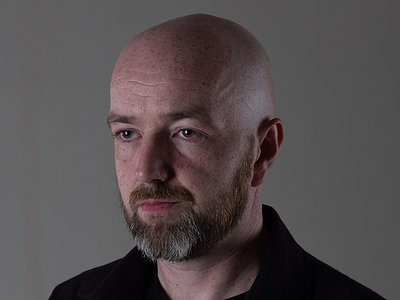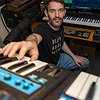How would you describe the relationship between technology and creativity for your work? Using a recent piece as an example, how do you work with your production tools to achieve specific artistic results?
DOM: Technology is most definitely a great help most of the time – as long as the technology doesnt get in the way of the creativity process.This can happen as sometimes I am at fault finding PC issues instead of making music! Definitely though the technology has been a great help for orchestral plugins, especially as I can’t afford to hire an orchestra for a week!
You can hear some orchestral strings on the “Breathe“ track from the Searchlight album that were done on a PC.
CIAN: We come from dance music production, Jungle/Drum and Bass specifically, so technology is everything to us.
Now with Searchlight we are using live musicians to realise ideas that we could never have made with just technology. For two guys who spent decades in caves making weird noises on our own, it’s a huge novelty for us to be working in a more traditional way on this project.
Within a digital working environment, it is possible to compile huge archives of ideas for later use. Tell me a bit about your strategies of building such an archive and how you put these ideas and sketches to use.
CIAN: Yes definitely - I have a massive archive of ideas (20+ years worth) that I go back in on all the time for later use. When I have finished a song / idea / loop, no matter how little elements are in it or how long it is, I will always bounce this audio out and store it in an archive of ideas that I will either come back to later to finish or I will come back to take say the just the drums out or maybe a rhodes loop and use these elements in a new track or another track I am working on.
Or sometimes I create a track from scratch from just combining these ideas together which can be really enjoyable, especially if you aren't feeling too creative to actually play something in via keyboard.
CIAN: I am a wonderful combination of impatient and lazy, so my archiving looks like a teenage boy's bedroom floor. I constantly get kicked in the teeth by this: being unable to find projects a year after you made them when premaster time comes around is one example. I never learn.
How do you retain an element of surprise for your own work – are there technologies which are particularly useful in this regard?
DOM: Retaining an element of surprise is so important for me in creating music. It's also what we are trying to achieve with Searchlight by toying around with different genres on the album and individually on some songs too. So you really never know what you are gonna get with a Searchlight track.
I don't use a technology as such to create an element of surprise per say, it's more of a compositional tool really ...
CIAN: I spend a large amount of time digging for samples. Samples = happy accidents = element of surprise.
Production tools can already suggest compositional ideas on their own. How much of your music is based on concepts and ideas you had before entering the studio, how much of it is triggered by equipment, software and apps?
DOM: Well creating music is enjoyable for me for this exact reason as ideas / inspiration can come from anywhere.
For the Searchlight album all of the above were in effect as some ideas / concepts we had before going in, were triggered by equipment (like “Preacher“ on the album was called that after using a Sequential Prophet synth) and others were just starting off with an empty DAW and just seeing where the music takes you.
CIAN: For me it can either be an idea that pops into my head, usually for a beat pattern or specific style of rythym, or it can just be messing around auditioning samples or parts of a freestyle by one of our musicians.
Have there been technologies which have profoundly changed or even questioned the way you make music?
DOM: One of the biggest changes for me was when first using 16bit 44.1kHz audio in the PC around 2003/4. So I no longer had to use a sampler, which in turn meant no more having to sit there and actually “record“ each and every sound / sample into the sampler as now you just loaded the files into the PC in 2 seconds – I got so much time in my life back because of this lol!
What really blew my mind when first discovering it was creating macros within the DAW and using the macro in conjunctionwith a touchscreen - before it would be 5 or 6 movements and clicks of a mouse to do a whole process which could take 2/3 minutes can now be done with one touchscreen button press in a few seconds.
CIAN: Switching from the MIDI world of sampler and analogue studio set ups to predominantly using audio processing inside the DAW was the biggest profound change for me.
I used to spend hours chopping and prepping samples in Soundfroge before putting them in the sampler. Now everything goes directly into the DAW as raw audio and the editing and manipulation mostly occurs there.
I only use the sampler to get a specific effect or if I want to transpose and play something across the keys. This changed the speed at which I compose at exponentially.
To some, the advent of AI and 'intelligent' composing tools offers potential for machines to contribute to the creative process. Do you feel as though technology can develop a form of creativity itself? Is there possibly a sense of co-authorship between yourself and your tools?
DOM: AI/Machine Learning is pretty prevalent in audio production now; Online AI Mastering Services, Online AI Stemming services (where you send a whole song and the service splits up the song into its individual tracks) … then you have plugins that have AI assistants built into them to analyse your audio etc. and this is great for a helping hand in these areas of analysis. This is as far as the co-creating / collaborating with AI would go for me.
As for actual composition of music by AI, it would probably be weird. Like the way Google's AI created crazy art pictures and they looked so strange. So the music I am guessing AI would create would be just as strange – I would like to hear it though to be sure!
CIAN: I’m not sure I like the idea of this in the macro sense. It could lead to some interesting sounds in the short term, but my main concern in modern music is injecting some oft he humanity, with all it imperfections, back into music created largely on machines.
What's most vital about music for me is that it’s the expression of human emotions as a non verbal, universal language. For that reason music composed by AI doesn’t hold much fascination beyond the initial curiosity.
What tools/instruments do you feel could have a deeper impact on creativity but need to still be invented or developed?
DOM: I think more tools for people who don't have any music theory to assist them creating music would be great to see. And more dedicated hardware controllers for software plugins and DAWs to get you away from the screen.
CIAN: I agree, anything that gets you away from looking. You don't look at music and the screen can be your enemy.



